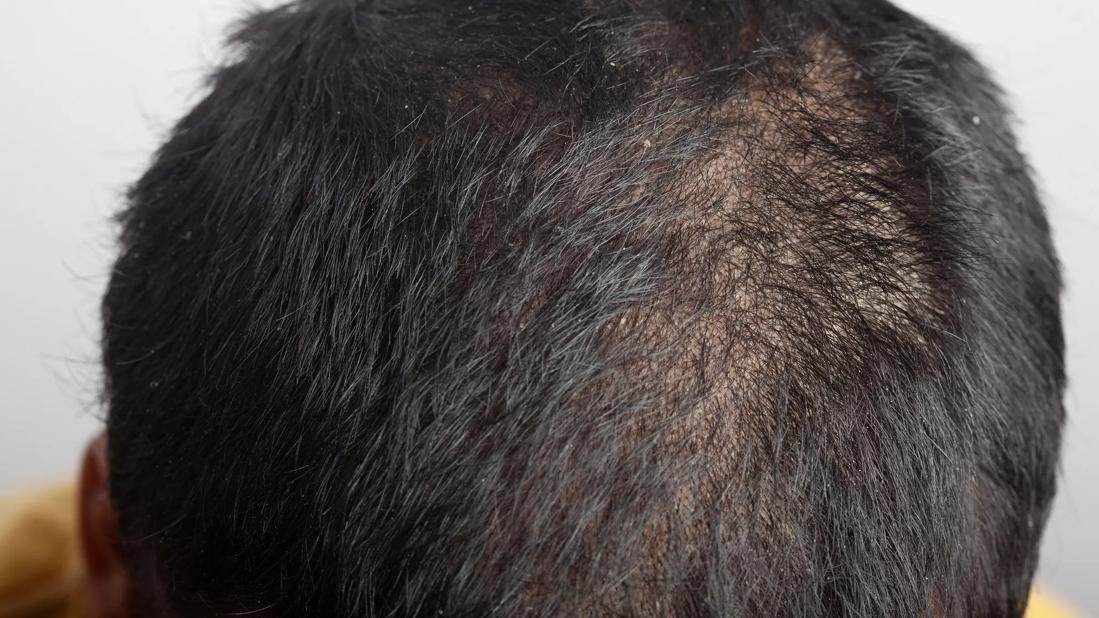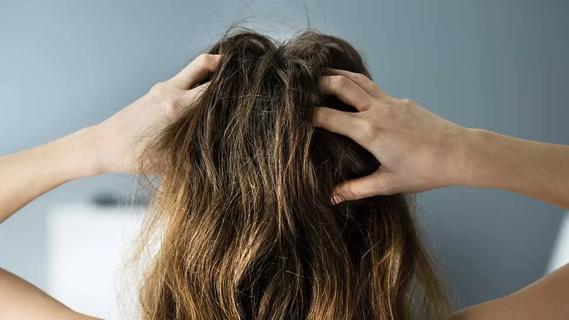Calm an itchy scalp by using medicated shampoo, avoiding blow-drying and resisting the urge to scratch

No one likes dry skin or dandruff, but scalp psoriasis can be a whole different challenge.
Advertisement
Cleveland Clinic is a non-profit academic medical center. Advertising on our site helps support our mission. We do not endorse non-Cleveland Clinic products or services. Policy
Psoriasis is an autoimmune disorder that causes skin cells to form faster than normal. With an increase in inflammation, these skin cells pile on to each other, causing silver or red itchy plaques to form on your skin.
If you have psoriasis, you can show signs of the disorder in your nails, on your knees or elbows and other parts of your body. Additionally, about 50% of people who have psoriasis show signs of the disorder on their scalp.
Dermatologist Christine Warren, MD, explains some of the unique challenges that come with scalp psoriasis — and how to prevent psoriasis hair loss.
Can psoriasis cause hair loss? Yes, in response to an increase in inflammation, your hair follicles can become weak and brittle. Paired with an itchy, dry scalp, you might feel inclined to scratch or pick at the scales caused by psoriasis.
“When you do that, you can make your scalp psoriasis worse,” says Dr. Warren. “As you try to relieve your symptoms with scratching, you could actually be causing some hair loss.”
Because of the inflammation, hair can fall out on its own, but further agitation can speed that process along.
Can hair loss due to psoriasis grow back? If the condition is adequately treated, scalp psoriasis hair loss is usually only temporary.
Advertisement
“The only reasons it possibly wouldn’t grow back are if you had chronic, severe scalp psoriasis that was left untreated or you had scratched so much or you had done so much damage, you were bleeding or causing sores on your scalp — and that could lead to scarring,” explains Dr. Warren. “But if we can calm the psoriasis down, treat it and get it under control, then in most cases, we can get that hair to regrow.”
So, how do you overcome all the discomfort and itchy feelings associated with scalp psoriasis without making it worse or furthering hair loss? Dr. Warren offers several tips to help manage symptoms.
“As you’re rubbing or scratching your scalp, it’s causing your hair to break,” says Dr. Warren.
Overall, you should avoid touching your scalp. But if you have to relieve some of that itchy feeling, gently rub the area with the soft part of your fingers.
To avoid picking or unintentionally scratching your scalp, keep your fingernails trimmed.
“It can sometimes feel like it’s impossible to resist scratching, but you can do less damage to your skin and your hair if your nails are trimmed,” advises Dr. Warren.
Gently comb your hair and don’t try to use the bristles of your brush or comb to forcibly lift the scales on your scalp. Concentrate on your hair itself and don’t apply too much pressure when combing, washing or drying.
Stronger shampoos can be prescribed, and there are some over-the-counter options specifically for psoriasis. Often, these shampoos contain salicylic acid. They soften the scale on your scalp and help loosen it so you don’t have to remove it forcibly.
“Salicylic acid breaks down some of that scale, which is basically dead skin cells,” explains Dr. Warren.
But medicated shampoos can dry out your hair, so it’s important to use a conditioner after you use them. Anytime your hair becomes drier, it’s going to be more brittle, which is why it’s important to be gentle and follow up with a conditioner.
As much as possible, allow your hair to air dry because your scalp is already dry from the psoriasis or medicated shampoo.
“If your hair is drier than usual during your treatment, allowing it to air dry is preferred,” notes Dr. Warren.
Your healthcare provider can prescribe a number of topical medications that can be applied directly to your scalp to assist with decreasing the amount of scales you have. Topical steroids come in a variety of types, including lotions, solutions and thicker ointments. These can help clear some of the scales without damaging your hair.
But for more difficult cases, there are also handheld laser treatments and steroid injections available.
Advertisement
“Many patients need something more because their scalp psoriasis is stubborn,” says Dr. Warren.
If you have moderate to severe psoriasis, you might also be prescribed oral or injectable medications to target psoriasis, not only on your scalp, but also on other parts of your body, nails or joints.
A bad sunburn can increase inflammation or a flare-up of psoriasis on your scalp, so remember to wear a hat when you’re outdoors.
“Different people have different triggers for psoriasis, and unfortunately, these aren’t things you can always completely avoid,” says Dr. Warren.
Since heavy drinking and high stress levels can be common triggers that cause psoriasis to flare up, it’s important to avoid these triggers when possible and practice relaxation techniques when you start feeling stressed.
When it comes to psoriasis and hair loss, it’s easy to confuse scalp psoriasis with dandruff or a mild rash. Unfortunately, in most cases, psoriasis is a lifelong condition that can flare up at any time.
If you’re experiencing a consistently itchy scalp, finding white or gray scales, and over-the-counter anti-dandruff shampoo isn’t working, you should see your healthcare provider about treatment for scalp psoriasis and hair loss.
Advertisement
“The primary goal here is to seek treatment and help manage your scalp psoriasis to decrease the possibility of hair loss,” says Dr. Warren.
Advertisement

Sign up for our Health Essentials emails for expert guidance on nutrition, fitness, sleep, skin care and more.
Learn more about our editorial process.
Advertisement

Lice don’t jump — but they can spread with direct head contact

Options range from allergic reactions and head lice to chronic conditions and fungal infections

The short answer from a dermatologist

Rosemary oil’s antioxidant, anti-inflammatory and antimicrobial properties could help stimulate hair growth

Bathing once a day is the general guidance, but you could also have reasons to soap up twice a day or not at all

Scalp cancers can occur because of long-term sun exposure

Your body’s response to rapid weight loss from the medication may cause shedding

Soften your skin with warm water and shaving cream before shaving with the grain of the hair

Even small moments of time outdoors can help reduce stress, boost mood and restore a sense of calm

A correct prescription helps your eyes see clearly — but as natural changes occur, you may need stronger or different eyeglasses

Both are medical emergencies, but they are very distinct events with different causes